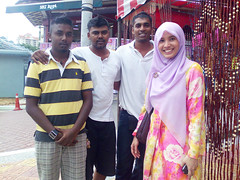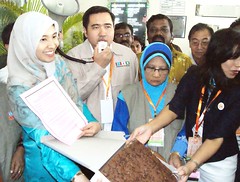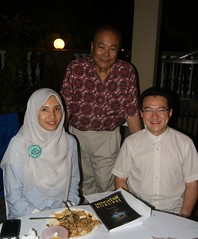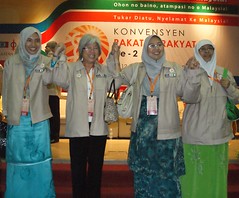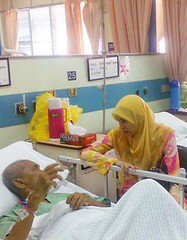 PKR Vice President and Lembah Pantai MP Nurul Izzah has become a familiar face to most Malaysians despite being a first time elected representative. She shares with The Rocket her views on the pressing challenges faced by the nation and why Pakatan needs to raise its game without any delays.
PKR Vice President and Lembah Pantai MP Nurul Izzah has become a familiar face to most Malaysians despite being a first time elected representative. She shares with The Rocket her views on the pressing challenges faced by the nation and why Pakatan needs to raise its game without any delays.
What made you interested in politics? Was it an obvious choice?
It was always a recurring theme throughout my secondary school years because my best friend in Assunta school was always very interested in politics and we used to discuss various issues in the literature and debating society at school.
But full-fledged politics only took off after 1998 because of the “Reformasi” and all that happened with my father’s sacking and consequent trial. I had never even attended a public rally prior to this period. So I began to learn about the issues regarding the weaknesses of our judiciary and the lack of civil liberties in this country.
I also worked with SUARAM and campaigned with leaders from DAP and PAS, which helped me understand the key issues facing the country. It is almost as if I grew up with leaders of the opposition rather than with my father at that particular time and it became a lifelong interest.
I pursued engineering in university and did my industrial training but it did not seem to be as fulfilling as politics or activism. After going through the “Reformasi”, I just found that this kind of work was very meaningful. I took a year off during my degree to help with my father’s trial and was able to meet many Malaysians living abroad to address the issue of Anwar Ibrahim’s political incarceration. Moreover, we met with many organisations and people who were sympathetic to our cause such as Amnesty International Japan.
Of course, I was fortunate because my father was very well known in South East Asia which helped us meet world leaders like Habibie (former Indonesian president) and Joseph Estrada (former Filipino president) as well as Madeleine Albright (former United States Secretary of State). I think I was seen as representing my family and it gave us the opportunity to campaign not just for my father but for all the ISA detainees by highlighting the bigger picture of human rights in Malaysia.
In this time (aged 19), I also spoke at the United Nations Human Rights Commission in Geneva to appeal for on behalf of my father and other political prisoners and was also a part of the ALTSEANBurma (Alternative Asean Network on Burma) movement involving Aung San Suu Kyi. It all served as a true awakening for me.
In light of a new year, what are your biggest concerns for Malaysia in the coming year?
The most crucial thing is how I envision the country’s future for my two children. I believe that all the issues are intertwined, be it race relations or our economic prospects. On all levels, we need reform and it begins with the politics of hope and liberation. This requires the executive to release its stranglehold on education, the media, the economy and various other public arenas. Everything is so controlled to the point where it is emasculating our true potential.
At the core of hope and liberation is my hope that all young Malaysians will stand up and embrace this new culture of speaking up against the transgressions of Perkasa, for example. Perkasa would not have become powerful without the support of Umno. It is continuing to increase its grassroots appeal so we cannot just be silent; we must advocate something fresh and positive. This is the way to capture the hearts of those who sit on the fence; after all, Pakatan Rakyat cannot survive on its own.
Where do the Perkasa-type entities stem from and what do they signal?
Firstly, Malaysia is at a crossroads; we have no choice but to implement reforms in terms of a new economic model that fits the current needs. Just look at the black empowerment policy of South Africa – there have been various times when it has been reviewed in light of new outcomes. With us, while the New Economic Policy (NEP) has changed slightly over time, in essence there is no reflection on the outcomes and whether it has served the needs of the Malays.
It is a strange paradox because on one hand, the Umno Youth chief says that 80 percent of the rural Malays remained mired in poverty as reasoning for the NEP’s necessity. But on the flip side, this shows that the NEP is not working. Due to this, the Najib administration cannot ignore that we are facing problems with the archaic policies that are in place.
Perkasa is a response to that; I think it is a cop-out by Umno because they have to try to maintain their support base through a group such as this as it is a known fact that any group which tries to implement reforms will face an inevitable backlash. But the fact of the matter remains that Perkasa is undeniably a tool of Umno which is sponsored by Umno and its events are unabashedly attended by present and former Umno leaders! Having Cabinet ministers and former premiers supporting such a group is testimony to Umno’s manipulative politics.
For me, we have to continue to engage with everyone in a rational discussion on the issues at hand; we can talk to the Malays and explain things to them. I don’t see a problem with that because nobody wants to be stuck in a cycle of poverty. I feel that certain political leaders deliberately do this so that they will continue to have power over their communities. So this issue needs understanding from all sides and of course, some may say I am more sympathetic to my own race, but in fact that is the reason why I want them to embrace the global frontier and challenges of the future because you cannot survive with a crutch forever – and this applies to my own children as well.
Why is race such an issue in Malaysia and should we be concerned?
This is a “sensitive” thing to say but when you equate a particular race with a particular religion and it is enshrined in the Constitution, then race will, of course, become an issue. However, this does not mean that Pakatan plans to amend the Constitution in any way; we respect it the way that it is but there are issues with implementation.
For instance, there are certain tribes in Sarawak that were previously animistic. If they now convert to Islam, I don’t believe that they should be declared as Malays! It is a matter of who they are and they also have certain rights accorded to them such as land and this further complicates the matter. We are a multiracial country and
many other multiracial countries also face problems with it; Malaysia has done relatively well in this regard. However, when we look at Indonesia, then perhaps we should be ashamed – having three major races is not something to fret about!
If more people just take a step further and believe that our diversity is truly our strength, it would make a huge difference. That’s what the Visit Malaysia ads are celebrating so it should not be a cause for concern; Tariq Ramadan (Muslim philosopher and theologian) always says that multiracialism is a fact of life so we should embrace it.
That’s why I am fearful for our future if groups like Perkasa really gain a foothold among various segments of society because while I can appreciate it if a group argues based on historical background or appreciation for culture such as the Malay language or the Kadazan dances which should be safeguarded, such arguments still have to be couched in a credible and nuanced manner rather than jingoistic nationalism.
Perkasa makes pronouncements such as attacking Teo Nie Ching’s surau visit and then the following week, they announce plans to hold huge “Woodstock-like” concerts – I mean, do they even know what happens during Woodstock? It just shows that they are shallow in their understanding of morality. This is why all Pakatan parties must continue to engage with Muslim groups to gain their understanding; because it is not Perkasa that
represents the majority.
What are your thoughts on the potential snap elections in terms of Pakatan’s chances?
It is not going to be easy for the opposition but then again, 2008 was not easy either. We were not expecting a huge win but our strength lies in being able to come up with ideas that capture the imagination of the electorate and our problem is that BN just copies those ideas. So this presents us with an opportunity and we better do something fast before the elections come.
The people expect a detailed alternative economic policy from Pakatan because they have heard about the NEM for so long and this is something that was addressed at the Pakatan Rakyat convention (held on 19 December). It was a good opportunity because we would not normally receive as much mainstream media coverage so we must make it meaningful when we get the chance.
I was given a similar opportunity when I spoke at the closing of the recent PKR congress. I said some things which were probably unpopular but it is important to showcase that we remain relevant with people’s expectations. Any party that forgets it is here to address the needs of electorates and not just party members might as well close its doors.
With PKR, I think people criticise us because they feel they have a stake in what we do and we have to see that in a positive manner. To be blunt, I think the people will only give us one last chance to prove ourselves and the media will also be tough on us; if we are seen to be without a plan when the government has multiple plans, then it will be hard on us during the elections. This is not child’s play and we must step up.
How did Malaysia arrive at this current state of rampant corruption and abuses of power?
I wrote on my blog after visiting South Korea recently for the 2010 Global Women’s Leadership Conference about the vast gap between that country and our. In the 1950s we were so much more advanced than Korea. Our GDP was almost four times higher than theirs and we were training our teachers in England in order to produce better educationists.
We also set up Petronas at that time and it was meant to help us manage our resources but along the way, it seems our leaders just forgot the importance of managing resources efficiently and leading by example; so we became corrupt. FELDA, which was set up to resolve the issue of rural poverty is now producing drug addicts and has become the hub of social problems.
We did not revamp the existing programs as it was needed over time. Umno-BN leaders still seem content to live in the past and Mahathir really succeeded in destroying the basic civil institutions that were needed to shore up our democracy, especially with the judiciary. Just look at the various amendments he introduced in Parliament; often in just one day’s sitting! Anything was okay, at his whim and fancy and there was just too much focus on hard infrastructure instead of soft skills.
The worst is when leaders simply see something and want to copy it; Proton and Perwaja are clear examples of such projects launched without clear research or understanding of what it takes for a particular industry to succeed. So it boils down to leadership; we had too many lousy leaders from the 1970s onwards. We cannot narrow it down to one person because many of them are responsible as well.
So it is time to stop living in the past and begin making the corrective measures in order to meet the future realities in the manner than South Korea has; and that is the strength of any country. We have to be tough on ourselves sometimes and that is severely lacking in Malaysia.
What gives you the conviction to continue championing for all Malaysians despite the attacks from those who call you a traitor to your race?
I am usually seen as a polite young lady in Parliament and this is part of the image of being the daughter of a former deputy prime minister. But I reached my limit when Defence Minister Zahid Hamidi lambasted me as a traitor (for speaking in August about Malaysia’s submarine that cannot dive to an Indonesian magazine).
I think respect has to be earned and some of these ministers do not deserve to be accorded with any respect. It is important for young people to understand that you should respect elders, but it is more important to have principles that you respect.
Lim Kit Siang made a very relevant remark recently at a ceramah, that while Pakatan is not perfect, we do have leaders that have been tested many times in the past for fighting for what they believe in and this has built our credibility over time. This is why I am happy to speak my mind, whatever may happen, and I can sleep well at night.
With the recent slew of controversies surrounding PKR and DAP during their elections, how do you think it has affected the public’s perception?
I think any party elections would be followed by full scrutiny and even more so with direct elections because for PKR, it was a three-month process. But the key issue with each party election is whether you can close ranks afterwards because it is a contest among brothers and sisters.
Secondly, direct elections are meant to minimise the issue of money politics and vote-buying. It is important to at least introduce this at this juncture. I don’t think it is politically viable for us to wait until we win federal power before we initiate this because people will only have even less motivation at that point in terms of democratising the party.
We do have to expect the bad press because of the controlled nature of mainstream media in Malaysia. But it is also because we are a relatively young entity in terms of governing states, aside from PAS. I believe that our success, especially in Penang and Selangor, showcases to the public that we are capable. However, perhaps we need to focus on our media management in terms of streamlining and what we put out there.
I think what happens in Pakatan is a reflection of what happens in the larger scope of Malaysian society; we discuss things instead of sweeping it under the carpet. It is perhaps good that we have disagreements now in our “newly married” state rather than to be like BN who still fights despite being together for over 50 years.
But we have to be mindful and the polling results are a good wake-up call because if we don’t manage the issue of communicating well with the public, we will be walloped at the polls. We have a good opportunity at the next elections and we have to be very careful, which is something that we must focus on as a coalition.
We must also remember that in a police state such as ours, nothing is kept secret which is another problem that we face in terms of security. So we have to keep it real but also have to be strategic because we need to understand that the electorate are not here to care about our problems; we are just here to help them once they vote us in.
That is why we need to come up with clear-cut alternative policies, not just pronouncements. Unfortunately, this is a competition to win over the people and some of the policies must be reflected in the Pakatan-led states. DAP, in this regard, is quite clear with the CAT principle (Competency, Accountability and Transparency) in Penang, despite the hiccups here and there. We have to also present an economic agenda that shows we are something different from the likes of PEMANDU which are funded with millions and feature va-va-voom PowerPoint presentations; that we have meaningful policies that are felt on the ground.
Our job is also to find the contradictions between NEAC’s presentation and PEMANDU and the fact that they are not doing things synergistically or transparently. But it won’t be easy to convince people because even though some of the criticism of us by the new media is unfair, we must accept that people’s expectations of us are much higher; this must not dishearten us.
Do you think you obtained the highest votes because the members relate to your platform or because they relate to what your father represents?
In all honesty, both factors play a part because I cannot deny that the party psyche remains intertwined with Anwar Ibrahim. We went through a very difficult time in 1999 and those who joined the struggle were very much a part of the reform movement which led to the party’s formation. For many years, the unifying force was the fact that our leader was imprisoned and he symbolised injustice.
The image of the black eye captured the essence of BN’s hegemony and cruel rule but my win also took a lot of convincing because there are many in the party who question why it should be accorded to the family. So I also have to prove myself and that involves three things: first, the individual which is myself; am I able to prove my worth and convince the members?
Secondly, I am Anwar Ibrahim’s daughter and that is an opportunity given to me because I may not have joined politics at all otherwise. So I embrace it wholeheartedly. But thirdly, there is responsibility; now that I have the post, what am I doing to do with it? After being given the support from various divisions, I want to take it to the next level to help the party to win the general elections.
I did not expect to win and did the same amount of ground level work; we went everywhere to meet the members without taking anything for granted, even when it was announced that I had the highest votes. You have to value each vote and despite the turnout being low, it was relatively good for party elections as compared to, say, the California primary elections which had a 25 percent turnout. This is the reality of voting and we have to improve certain aspects of the process but I think we can be proud of the victories we achieved and the trust shown by members.
How do you juggle so many things at such a young age?
Without being gender-biased, it is definitely harder to be a woman and juggle work and family, regardless of whether it is politics or any other job. The landscape is created to fit a male personality and a woman is constantly compared to her male counterparts.
I have two kids and while the job is not easy, I believe I am doing this for my children. For example, with preschool education, I do not want to have to send my daughter to Permata schools! Beyond that, there is the larger issue of the state of our educational institutions and it all boils down to each of us playing our role.
Actually, I can’t wait for the next person to do it but it’s also about what I can do in this particular opportunity given to me. I am blessed with good support from my family and since I live with my parents, it is easier. My husband works in Brunei which is a challenge but I think you have to be determined and strong to succeed in politics, or in anything else.
I am also fortunate that both my husband and I are working so there are two incomes which allow for us to afford domestic helpers. But what about those who earn below RM5000? It is hard to comprehend how women cope with a salary of RM1000 or less and that is why policies have to be introduced that are friendlier to women.
What are some of your hobbies?
Most of my free time currently is spent attending to my son because he is at the age where he wakes up many times during the night. And somehow, the more challenging my schedule is, such as during the PKR elections, the more he decides to wake up at night! (laughs)
But yes, I do read a lot and I love music especially Radiohead and The Strokes. On the Malaysian scene, it would have to be M. Nasir and Reza Salleh.
Who are some people you respect – whether in politics or beyond?
Daw Aung San Suu Kyi is one of the most amazing people I have met for two reasons; firstly, she has remained steadfast even through personal difficulties such as not being able to see her husband even when he died from cancer. Secondly, the fact that she can transcend from personalising her struggle to rise above and see the bigger picture of her nation’s people.
I try to emulate her in small ways because as a leader, you shouldn’t have a chip on your shoulder – a lot of leaders have that and I think it is not very appealing. Moreover, you can serve people better if you can keep in mind that the struggles are for the country and are not about your own self. But this is not easy; there was a period I struggled through when people attacked my father and it took me awhile to realise that it’s not about Anwar Ibrahim the person, it’s about what he symbolises and because of that, we must understand the expectations that follow. -The Rocket

